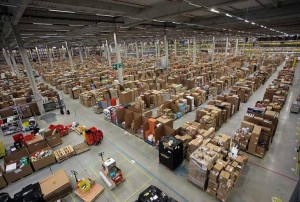 I enjoyed George Packer’s New Yorker article on Amazon, and recommend it. ArtsJournal’s link to the story has the heading “Is Amazon good for books? Not just publishers, but books themselves?” The New Yorker’s own sub-heading is “Amazon is good for customers. But is it good for books?”
I enjoyed George Packer’s New Yorker article on Amazon, and recommend it. ArtsJournal’s link to the story has the heading “Is Amazon good for books? Not just publishers, but books themselves?” The New Yorker’s own sub-heading is “Amazon is good for customers. But is it good for books?”
I find the question a bit puzzling. I can understand asking whether the rise of a particular corporation is good for buyers, publishers, authors, or other types of person. But what does it mean to ask, as a separate question, whether Amazon is “good for books?”
Packer’s essay concludes:
At the moment, those people [people who read] are obsessed with how they read books—whether it’s on a Kindle or an iPad or on printed pages. This conversation, though important, takes place in the shallows and misses the deeper currents that, in the digital age, are pushing American culture under the control of ever fewer and more powerful corporations. Bezos is right: gatekeepers are inherently élitist, and some of them have been weakened, in no small part, because of their complacency and short-term thinking. But gatekeepers are also barriers against the complete commercialization of ideas, allowing new talent the time to develop and learn to tell difficult truths. When the last gatekeeper but one is gone, will Amazon care whether a book is any good?
At Slate, Matt Yglesias responds:
Presumably Amazon will not care whether a book is any good, anymore than Borders or Barnes & Noble ever cared, or any more than the publishers of the endless series of Tom Clancy spinoff books care.
But maybe The New Yorker will care? And recommend that readers buy books that are good while not buying books that are not good? And so will other publications? And thus impressing tastemakers will be an important way for authors to gain sales? This just seems like an element of the publishing industry that isn’t changing at all. Quality matters, to the extent that it matters, not because retailers care about quality but because (some) readers care about quality and various media institutions try to give people information about which new books are good. For example, people interested in American public policy should read Lane Kenworthy’s Social Democratic America, and anyone remotely interested in economics needs to read Thomas Piketty’s Capital in the 21st Century. The quality of those books matters because I (and others!) say that you should buy them due to their high quality. Amazon is indifferent to whether you buy good books or bad books, but I’m not indifferent and neither is George Packer and nor are lots of other writers and editors out there. Together, we have the power to make quality pay—if our audiences find our recommendations to be reliable.
I agree, but let me shift the focus a bit. The value of the publishing industry, including its retail delivery system, is in how it benefits consumers (i.e., readers). “Consumption is the sole end and purpose of all production.”
Readers, like consumers of any other product, value quality of product, a variety of options from which to choose, convenience in finding the best choice and getting it into their hands, and a low price. That is true when we shop for cars, groceries, apartments, clothing, music, books, or anything else. If an industry has been improving in those terms, good. But the good is judged in terms of the satisfaction of the people served, not the products themselves. I don’t ask whether Kroger is good for food, I ask whether it is good for people who eat. And so the headline “Amazon is good for customers. But is it good for books?” doesn’t quite make sense to me.
If we thought it were the case that Amazon was good for readers in terms of convenience and low price, but that in the long run it would lead to lower quality of books, and fewer options, then we would have an interesting question about whether, on the whole, it is good for readers. But that is how to frame the question.
My two (Canadian) cents: Amazon has been good for range of options, convenience, and price, to a remarkable degree, and I have not noticed a reduction in quality of new books being produced. So it has been unquestionably good for this reader.

I also agree with Dr. Rushton and would like to put in my two Chinese cents: Amazon has been good in defying cultural chauvinism by dissolving the long-lasted and well-accepted limitations imposed by physicality and geography and by offering reasonable prizes affordable by the general public which used to be excluded out of the synchronized conversation available to the privileged few who could buy their way into this sphere. So much so that we Chinese students can have access to the world-class academic research findings and cultural outputs produced at the other side of the Pacific. Isn’t it a contribution to human civilization?